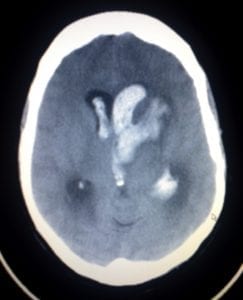Deadly Pradaxa (Dabigatran) — The Evidence is Mounting
Published today in the Journal of Neurosurgery is a shocking report detailing the death of an elderly gentleman who had begun taking Pradaxa (Dabigatran) just one month earlier. Three University of Utah doctors (Garber, Sivakumar and Schmidt) report that the man died from catastrophic, irreversible brain hemorrhage after suffering a very mild trauma to his head.
The gentleman who had fallen at home presented to the emergency room and was found to have a normal neurological exam with a normal Glasgow Coma Score. Initial imaging showed several areas of bleeding in his brain. He was admitted and underwent neurological surveillance and testing. Within an hour his speech became garbled. Repeat imaging of his brain showed that the bleeding had increased.
According to the report, the patients’ neurosurgical team was well aware that there was no effective reversal agent for Pradaxa. Nevertheless, as a last resort they administered the fastest acting, most effective reversal agent used for reversing other blood thinning medications.
It didn’t work.
The patient continued to rapidly deteriorate and a repeat CT scan performed only 6 hours after the patient’s admission showed extensive progression of the intracranial hemorrhages. The prospects for his recovery were so dire that after consultation with the family he was transitioned to supportive care and died shortly thereafter.
Even though this is only one case, these physicians felt compelled to publish the case to highlight the danger for patients taking Pradaxa should they suffer a trauma. In this case, a minor fall caused catastrophic bleeding that the doctors were powerless to stop. The patient was dead only hours after being admitted to the hospital.
As we have reported before, Pradaxa is essentially a blood thinner; used for similar health issues as is Coumadin. These medications are frequently prescribed to treat atrial fibrillation or a particular type of irregular heartbeat that can lead to stroke causing blood clots. Unlike Coumadin, Pradaxa has no effective reversal agent. So, if a patient taking Pradaxa suffers a trauma or internal bleeding there is no way to stop it.
Where the packaging and label for Pradaxa contains a warning that the drug may cause bleeding, it does NOT contain a warning that unlike other blood thinners, Pradaxa does not have an effective reversal agent. The very bleeding warned of in Pradaxa’s label can cause patients to bleed to death.
Kudos to physicians for writing about these dangers but, this information does not generally make it to primary care doctors or patients when it’s written about in the Journal of Neurosurgery.
It’s time for the FDA to step up and demand that Pradaxa’s manufacturer include such a warning in the label.
Share This



